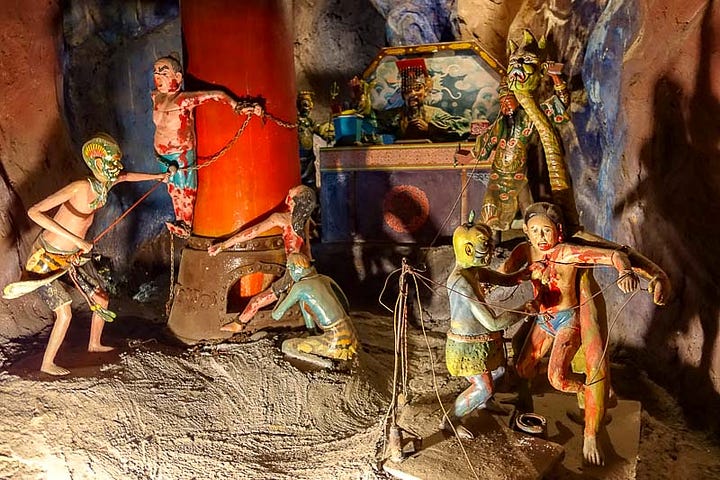For the last few years, I have used October to give myself a viewing assignment: a different horror film each day. Now that I have escaped the real life horror of New Zealand’s public service, I intend to write a piece inspired by each film.
My twenty-ninth film is Wu Ma’s The Dead and the Deadly / 人嚇人 (1982).
I’m probably stretching my definition of jīangshī for this last one—there’s no hopping ‘vampires’ to be seen. It’d probably be more accurate to say that my October viewing included five Hong Kong horror comedies from the 1980s and 1990s. Having said that, The Dead and the Deadly bridges the gap between 1980s Close Encounters of the Spooky Kind and 1985’s Mr. Vampire with much of the same actors, techniques and iconography I love so much.
It stars Sammo Hung (whose acting and direction defined many jīangshī films) as a guy who works for a funeral service. His peers disparagingly referred to him as ‘fat boy’, unaware of the fact that that martial arts superstars come in many shapes and all those are valid. Lam Ching-Ying plays his boss Uncle Yee in old-age makeup. He hasn’t yet fully found the character he would return to again-and-again for the rest of his life and is a bit less competent and more bumbling here (as well as older). The plot revolves around an impotent old man (portrayed by director Wu Ma) who fakes his own death as part of a scam to get rich off of grave goods but ends up actually murdered.


Other than the cast and crew, the other thing that links this film to the jīangshī tradition is the historical and religious iconography. Lam’s character wields Taoism like a superpower and the creatures he must battle are decked out in similar Qing-era costumes. These include not just your standard ghosts but also a trio of goblin-like demons who threaten to take Hung’s soul to the underworld. If you love seeing films that feature different types of weird little guys then this one is for you!
The film is lighter on action than some of its contemporaries but has a few fun fight scenes as well as a few that involve Wu Ma’s pregnant wife (Mei Hui Leung) getting repeatedly kicked in the face. Although the treatment of women characters isn’t great overall, Hung’s love interest (Cherie Chung) is the one who ultimately saves him from the demons so it’s not all bad.
Overall this is a fun little oddity that delves deeper into the afterlife than most jīangshī films and has more fake dead bodies than an Edgar Allan Poe story.






